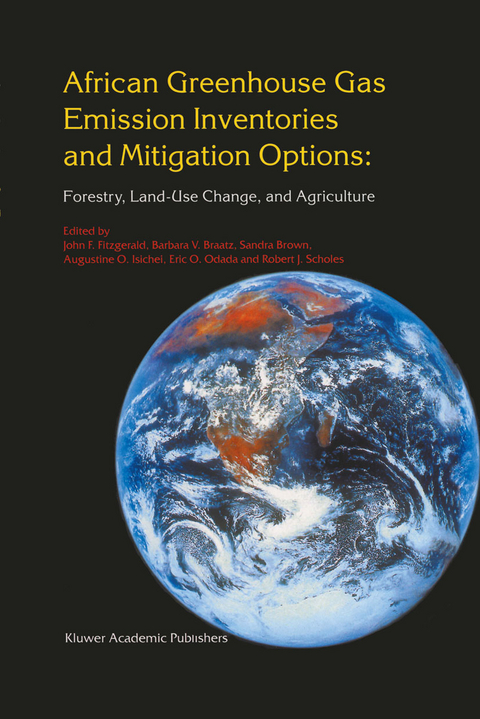
African Greenhouse Gas Emission Inventories and Mitigation Options: Forestry, Land-Use Change, and Agriculture
Springer (Verlag)
978-94-010-7232-8 (ISBN)
To further the development of emission inventories and mitigation options within the African context, 64 governmental and non-governmental scientists and policy analysts from 23 nations gathered at a workshop near Johannesburg, South Africa from 29 May to 2 June 1995. The workshop focused on forestry, land-use change, and agriculture, because these sectors not only are responsible for the majority of emissions from the continent and provide promising opportunities for emissions mitigation, but also are a vital component of African economic growth and development.
This book presents the workshop's major conclusions and findings, as well as individual papers that were prepared for the workshop, each of which was peer-reviewed and accepted for publication as part of the workshop process. The papers cover four areas: (1) issues are associated with data collection and emission factor determination; (2) problems associated with applying the IPCC inventory methodologies in Africa; (3) results of national inventory assessments in Africa; and (4) possible emissions mitigation options and methods for evaluating their potential viability.
As the first book dedicated solely to greenhouse gas emissions and mitigation options in Africa, this will be an invaluable resource to scientists, policymakers, and development specialists interested in global climate change and Africa.
1. Workshop Summary Statement.- African Greenhouse Gas Emission Inventories and Mitigation Options: Forestry, Land-Use Change, and Agriculture.- II. International Context.- Scientific Aspects of the Framework Convention on Climate Change and National Greenhouse Gas Inventories.- Selected International Efforts to Address Climate Change.- III. Greenhouse Gas Emission Inventories and Mitigation Options: Methodological Issues.- Use of Forest Inventories and Geographic Information Systems to Estimate Biomass Density of Tropical Forests: Application to Tropical Africa.- Greenhouse Gas Emissions from Vegetation Fires in Southern Africa.- Determination of Biomass Burning Emission Factors: Methods and Results.- Determining the Global Significance of Local and Regional Mitigation Strategies: Setting the Scene with Global Integrated Assessment Models.- Assessing National Livestock Populations for the Production of Methane Emission Inventories.- Carbon Storage in Eucalyptus and Pine Plantations in South Africa.- The Burning of Fuel wood in South Africa: When Is It Sustainable?.- Biofuel Use Assessments in Africa: Implications for Greenhouse Gas Emissions and Mitigation Strategies.- Carbon-to-Nitrogen Ratios in Agricultural Residues.- IV. Greenhouse gas emission inventories: national assessments.- Fuel Characteristics and Emissions from Biomass Burning and Land-Use Change in Nigeria.- Greenhouse Gas Emission Inventory for Senegal, 1991.- Emissions of Greenhouse Gases from Agriculture, Land-Use Change, and Forestry in the Gambia.- Greenhouse Gas Emissions from Forestry, Land-Use Changes, and Agriculture in Tanzania.- List of Participants.
| Zusatzinfo | X, 220 p. |
|---|---|
| Verlagsort | Dordrecht |
| Sprache | englisch |
| Maße | 160 x 240 mm |
| Themenwelt | Naturwissenschaften ► Biologie ► Ökologie / Naturschutz |
| Naturwissenschaften ► Geowissenschaften ► Geologie | |
| Naturwissenschaften ► Geowissenschaften ► Meteorologie / Klimatologie | |
| Weitere Fachgebiete ► Land- / Forstwirtschaft / Fischerei | |
| ISBN-10 | 94-010-7232-9 / 9401072329 |
| ISBN-13 | 978-94-010-7232-8 / 9789401072328 |
| Zustand | Neuware |
| Haben Sie eine Frage zum Produkt? |
aus dem Bereich


